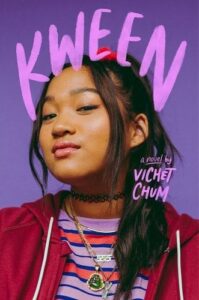Buy this from Bookshop.org to support local bookstores and the Lesbrary!
Kween is a character-centric book about Soma Kear, a Cambodian teen whose life in Lowell, MA has been deeply shaken. Soma’s Ba has been deported, her Ma is in Cambodia with him, her Bridezilla sister is in charge… and Soma just wants to make sense of things. With a viral TikTok video, an upcoming poetry contest, a loyal best friend, and a (hopefully!) new girlfriend, Soma just might be able to find her voice.
The queer content in this book is nice. Truly, “nice” is the best word for it. The relationship is comfortable and easy. Soma’s parents are supportive when she comes out; though they do worry she may experience challenges outside the home, these challenges do not occur on the page. This is a safe book for a lesbian protagonist to explore her identity and feelings.
However, when that holds true for all facets of the narrative, it becomes a problem. Soma is always safe to explore her feelings. That may sound like a positive, but for me, it felt indulgent and excessive and made for a deeply frustrating reading experience. Soma wants to find her voice… but she already has her voice. She’s already facing a parent-teacher meeting for an essay she wrote a bit too loudly. Her TikTok video goes viral in the first few chapters. Her poetry is encouraged and praised and everyone believes in her.
All of that could be positive, if Soma weren’t so acutely cruel. I have never hated a main character as much as I hate Soma, maybe because I was bullied in high school and Soma is a high school bully. She’s not trying to find her voice. She’s using it. When she’s not lashing out actively at others, she’s filling the first-person narrative with complaints about the sister who uprooted her own life to help her family, the best friend who does nothing but support and cheer for her, the lonely classmate who just wants a friend. All of this seems somehow excusable to the greater narrative. She rarely faces consequences, and when she does, it all comes wrapped up in words of encouragement, reassurance, and admiration.
Again, this could be great. I love the idea of a character allowed to be messy without being condemned, but that character needs to address if they cause hurt, and Soma does. The entire book, all she cares about is herself. Of course she makes an apologetic gesture at the end, but even then, it seems to come from a sense of her own grandeur, not actually caring about anyone else. Soma is a deeply flawed, deeply flat character experiencing a narrative of encouragement and indulgence.
From a narrative standpoint, this book is unbalanced. I said earlier that the queer content is nice, and that’s true. It also feels almost perfunctory. The book lacks a central focus—it wants that focus to be the poetry contest, but it’s not. The contest is the second-act climax and has no impact on the rest of the book other than being dismissed when Soma is done having feelings about it. And that’s honestly representative of the whole book.
A well-intentioned but deeply flawed reading experience, overall.

